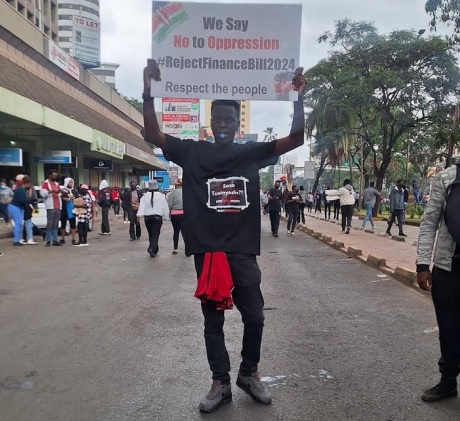Summary:
- Kenya is witnessing widespread youth-led protests against new tax proposals in the FY 2024/25 budget, with confrontations between protesters and police in major cities. This has sparked disbelief in Uganda, where similar protests often face severe repression. The Kenyan protests, part of the country’s long history of political dissent, contrast sharply with Uganda’s more restrictive environment, prompting Ugandans to question whether such defiance could occur in their own country.
NAIROBI, (Examiner) – Since June 18, Kenya has been engulfed in widespread protests, predominantly led by the youth, against the new tax proposals in the annual budget for FY 2024/25. These demonstrations, marked by intense confrontations with riot police in Nairobi and other major cities, have sparked curiosity and disbelief in neighboring Uganda.
On the social media platform X, Ugandans expressed astonishment at the restraint shown by Kenyan police. “How come no stray bullets have killed any protesters,” one user remarked. The surprise was further fueled when CNN International Correspondent Larry Madowo shared a clip of a courageous young Kenyan woman standing up to riot police, prompting questions about whether such defiance could occur in Uganda.
One Ugandan commentator, Pru Nyamishana, responded, “With Uganda, you just can’t do that. I feared the Uganda police when they arrested Nana when she was pregnant.” This sentiment reflects the broader perception of Uganda’s more repressive approach to dissent.
Let Us Build Your Online Success!
We are the experts in creating visually stunning and functional websites. With reliable hosting and exceptional customer support, we bring your vision to life. Join hundreds of happy clients who trust us!
Get Started Now📞 Call/WhatsApp: +256 207 800 192
Academics Travis B. Curtice from Emory University and Brandon Behlendorf from the University at Albany have explored this issue. Their research, published in the Journal of Conflict Resolution, highlights how repressive measures by security forces in Uganda often lead to increased political dissent and decreased support for the regime. They note that the arrests and trials of opposition figures like Robert Kyagulanyi Ssentamu have only fueled further protests and political unrest.
Evelyn Lirri, another Ugandan commentator, pointed out the fatal consequences of protests in Uganda, sharing a grim reminder of the November 2020 riots that resulted in numerous deaths. This has led to a perception that Ugandans are less likely to protest due to the high risks involved.
Kenya, on the other hand, has a rich history of political protests dating back to the Mau Mau uprising during the colonial period. Protests have been a recurring feature in Kenyan politics, often leading to significant political changes. The current protests are seen as part of this ongoing legacy, with Kenyans demanding a more accountable government.
The protests have already seen at least one civilian death and numerous injuries, with Amnesty International reporting over 200 injuries and more than 100 arrests by June 21. Despite these challenges, the protests have persisted, with demonstrators targeting key government institutions and demanding the rejection of the Finance Bill 2024.
Kenyan President William Ruto, who came to power promising economic relief for the “hustlers,” has faced criticism for imposing new taxes that have significantly increased the cost of living. While Ruto maintains that the new taxes are necessary to fund development projects and pay off national debt, many Kenyans feel betrayed and are calling for a complete overhaul of the bill.
The contrasting responses to these tax protests in Kenya and Uganda highlight the different political climates in the two countries. While Kenyans continue to exercise their right to protest, Ugandans watch with a mix of admiration and skepticism, questioning whether such movements could ever gain traction in their own more repressive environment.

